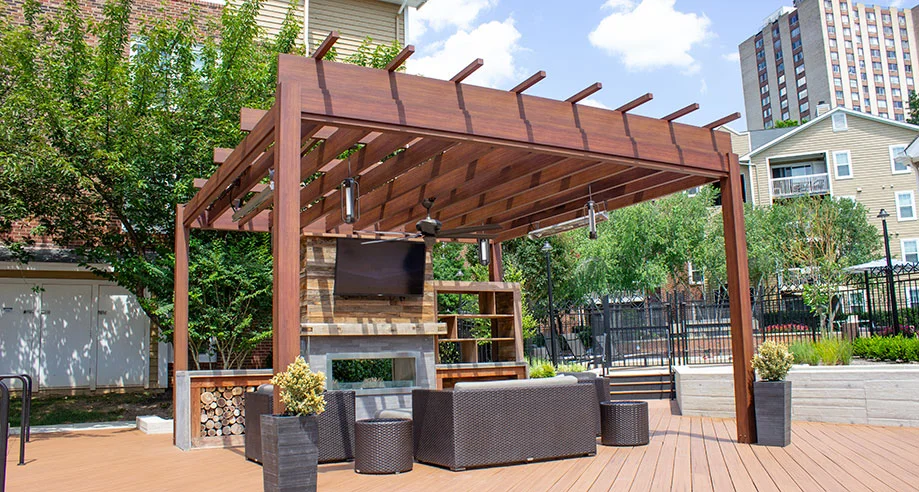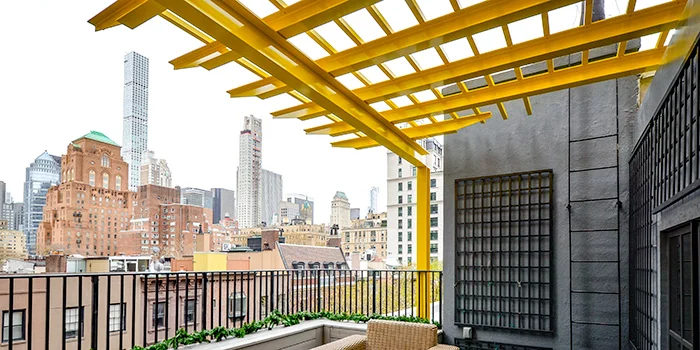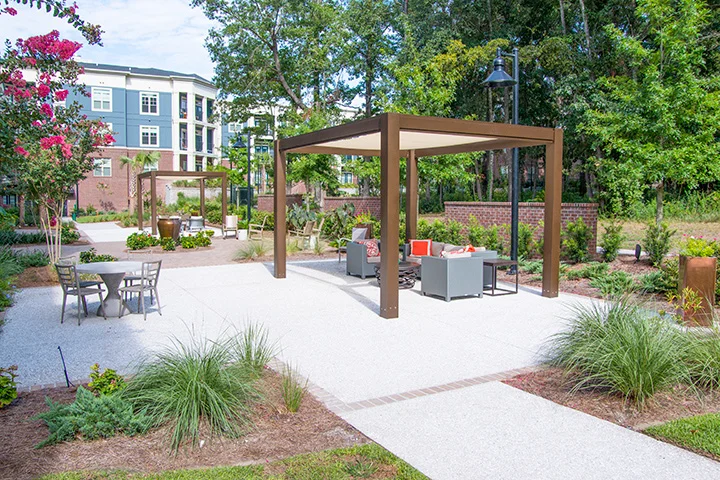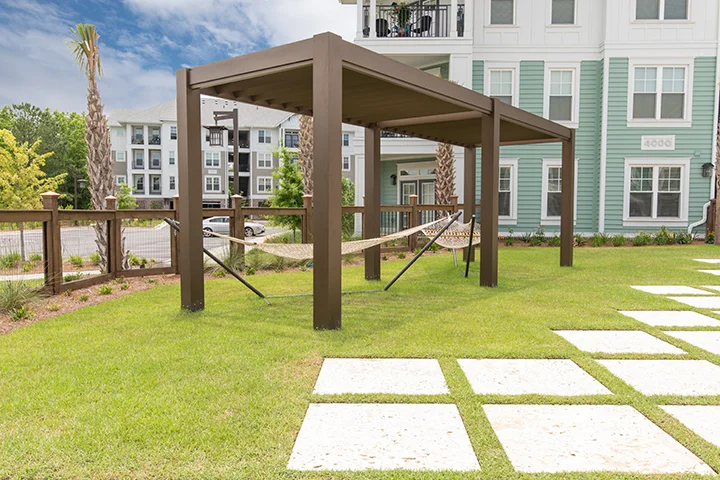
Pergolas are one of the hottest trends in landscaping, showing up everywhere from urban parks to rooftops, and more urban landscape developers and architects are beginning to include pergolas in their designs. Pergolas that are done for a small garden or residential design may be built of wood, but commercial applications have needs that wood is unable to meet. That’s what makes aluminum the better choice for pergolas of all sizes, styles, and placements.
Wood Pergolas
Pergolas have been around since approximately the 1640’s and were often used for training vines over paths or walkways, and could be found in a variety of gardens and parks. By necessity, they were built of wood.
Over the years, pergolas changed in size, style, and placement, but continued to be made of wood. They became sturdier, could incorporate shades or canopies, and were designed to be freestanding, while others attached to homes or buildings. Wood is beautiful, can be cut and carved into a variety of shapes, and stained or painted in different colors and finishes. There are also several species of wood that are well- suited to being used in pergolas, so different grains and characteristics can be played up.
Pros of Wood Pergolas
Wood is very versatile, which can mean that you have a lot of options for the style and appearance of the pergola. It’s also timeless and has a natural appeal that may make it a more requested material by clients. It also works well for small projects such as gardens or patios, where it’s not going to see a lot of daily use.
Cons of Wood Pergolas
For a small garden or backyard project, wood pergolas may work well, but wood has some drawbacks that might mean that it’s not always the best material for the job. This is particularly true for commercial and large-scale projects.
Wood needs to be stained or painted to help protect it from the elements. There are a few types of wood like cedar that are naturally insect-repellent, but most woods are susceptible to insect activity and moisture problems. Wood can swell, warp, and crack after exposure to the elements, and any finish that may be applied can experience bleedthrough, as well as chipping, peeling, and cracking of the paint or stain that will require scraping and repainting every few years.
Wood can also experience issues such as dry rot, which may make the structure less stable and will require a lot of expensive repairs over the years. Wood is also combustible, and therefore unsuited for some applications where there may be risks from fire.
Wood is beautiful and versatile, but it doesn’t always make the right material to build from, particularly when you’re constructing or planning a pergola for urban and commercial applications.
Aluminum Pergolas

Aluminum pergolas are just as attractive as wood, with even more versatility, better durability and lower maintenance. Aluminum is ideal for creating more modern pergola designs that are better suited to urban landscaping, and the material can also be treated to give it a simulated wood-grain appearance so it can still have a more classic or traditional look. This makes aluminum suitable for any design or application.
Pros of Aluminum Pergolas
Aluminum pergolas are custom-designed which means that they’ll be extremely durable and able to withstand the climate and be utilized the way they are intended. Like wood pergolas, they can be freestanding or attached to a building, they can be covered, include canopies, or have an open, classic design. Aluminum comes in many different sizes, and with an increased strength, you can find more narrow and sleeker styles than wood, without compromising on durability.
Aluminum pergolas are coated with a fluoropolymer finish that lasts for years. It can give your pergola a bright, bold finish, or a subtle, muted, wood-grain finish that won’t need the same level of care or reapplication that wood pergolas require.
Cons of Aluminum Pergolas
There are few drawbacks to using aluminum to construct pergolas. They’re attractive, versatile, and can have the same appearance as wood. The only potential drawback would be the slight learning curve involved with designing and building them; if someone has only worked with wood, they may find aluminum initially intimidating. Once they’ve worked with aluminum, this concern should fade.

Working with Aluminum Pergolas
Aluminum pergolas kits can be easily constructed onsite. They use stainless steel hardware, and the ends are welded to give you a stylish appearance and added performance. Like wood, you can find aluminum pergolas with curves, cantilevers, arches, and other classic and innovative styles. If you can imagine it, you can create it.
Aluminum pergola kits have standard extruded sizes that range from 1-inch by 1-inch up to 8-inches by 12-inches, and there are custom sizes available as well. These size ranges give you more flexibility in designing and building than wood, because aluminum will have greater strength and the ability to withstand use even at narrower widths.

A Better Alternative to Wood
As more people realize the many benefits and uses of pergolas in their architecture and landscaping design, the demand for these structures is only going to rise. By utilizing aluminum to meet the demand, you can ensure that each structure you build is going to last, which will save your clients both money and maintenance, and in turn, will increase your reputation.
Aluminum offers more customization, better durability, increased longevity, and more styles and finishes than wood, which means that you can offer your clients more options to fit their unique landscaping and needs. Wood has been used for centuries, but the needs of cities and landscaping have changed, and therefore the materials that are used need to adapt and change with them which makes aluminum the right choice over wood for building commercial and urban pergolas
Choose a Better Material for Your Pergola
When deciding on aluminum vs. wood pergolas for your next design, remember that aluminum pergolas are designed to last for years with less maintenance and far greater durability. Aluminum can also give you more versatile looks, including a wood-grain finish, as well as more contemporary styles.
Aluminum pergolas include: Stratus, Harbor, Breeze, Trex Pergola Element, Trex Pergola Shadow, Trex Pergola Pavilion, Trex Pergola Retreat & Trex Pergola Solis